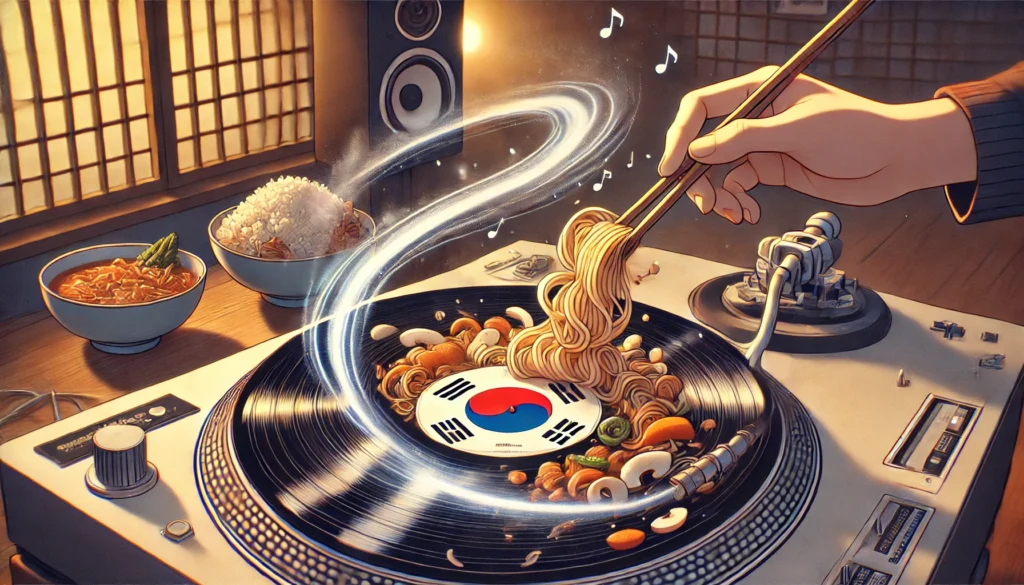The haunting melodies that float above dreamy instrumentation. The raw, emotional lyrics that explore grief, identity, and heritage. The boundary-pushing music videos that showcase a distinct visual aesthetic. Michelle Zauner has established herself as one of the most compelling creative voices of her generation, captivating audiences not only with her music as Japanese Breakfast but also through her bestselling memoir and multimedia projects.
With over 50,000 monthly searches in the United States for “Michelle Zauner,” it’s clear that her artistic impact continues to resonate deeply with a growing audience. Whether you discovered her through the ethereal dream-pop of Japanese Breakfast, her heartbreaking memoir “Crying in H Mart,” or her recent forays into film scoring and video game soundtracks, Michelle Zauner‘s multidisciplinary approach to art offers something for everyone.
In this comprehensive guide, we’ll explore Michelle Zauner‘s fascinating journey, her exploration of Korean-American identity, her diverse creative outputs, and why her work has struck such a powerful chord with audiences worldwide.
Want to explore Japan’s culture?
Discover Japan’s rich culture, traditions, and hidden gems with our expertly crafted guides. Get insider tips on travel, food, and history. All for free!
Who Is Michelle Zauner? Understanding Her Background
At the heart of Michelle Zauner‘s work is her unique life experience and cultural background, which has profoundly shaped her artistic output.
Early Life and Heritage
Born in Seoul, South Korea in 1989 to a Korean mother and Jewish-American father, Michelle Zauner moved to Eugene, Oregon as a child. This bicultural upbringing created the foundation for many themes that would later define her creative work:
- The experience of straddling two cultures
- Complex relationships with family and heritage
- Food as a connection to cultural identity
- The feeling of belonging neither here nor there
Her early exposure to both Korean and American cultures created a rich tapestry of influences that would eventually inform her distinctive artistic voice.
Musical Beginnings
Long before becoming a household name, Michelle Zauner cut her teeth in the East Coast indie music scene:
- Formed her first band, Post Post, while attending Bryn Mawr College
- Fronted the Philadelphia-based emo band Little Big League
- Returned to Oregon in 2013 to care for her mother, who had been diagnosed with cancer
- Began Japanese Breakfast as a solo recording project during this difficult period
This formative musical education, combined with the profound experience of losing her mother to cancer in 2014, set the stage for the emotionally resonant work that would bring her international recognition.

Michelle Zauner’s Creative Output: Beyond the Music
What makes Michelle Zauner particularly fascinating as an artist is her refusal to be confined to a single medium or creative outlet.
Japanese Breakfast: Musical Evolution
As the creative force behind Japanese Breakfast, Michelle Zauner has released three acclaimed albums that showcase her evolution as a musician:
- Psychopomp (2016) – A dreamy, lo-fi exploration of grief following her mother’s death
- Soft Sounds from Another Planet (2017) – An expansion into science fiction themes and more elaborate production
- Jubilee (2021) – A vibrant celebration of joy that marked a departure from the melancholy of previous albums
Each album demonstrates Michelle Zauner‘s growth not only as a songwriter but also as a producer and arranger, with increasingly sophisticated sonic landscapes accompanying her intimate lyrics.
“Crying in H Mart”: Literary Success
In 2021, Michelle Zauner published her memoir “Crying in H Mart,” which became an instant New York Times bestseller. The book, which expanded on her viral 2018 New Yorker essay of the same name, explores:
- Her relationship with her mother and the devastation of her loss
- Korean food as a connection to her heritage and memories
- The experience of growing up Korean-American in predominantly white communities
- The process of reclaiming her Korean identity after her mother’s death
The memoir’s success introduced Michelle Zauner to an entirely new audience beyond her music fans and established her as an important literary voice on grief, identity, and the Asian-American experience.
Visual Storytelling and Directorial Work
Michelle Zauner‘s creative vision extends to visual storytelling, where she has directed numerous music videos for Japanese Breakfast that display a distinctive aesthetic:
- “Everybody Wants to Love You” – A joyful exploration of Korean-American identity
- “Boyish” – A prom-night narrative with subtle queer undertones
- “Savage Good Boy” – A post-apocalyptic story featuring actor Michael Imperioli
Her directorial work demonstrates yet another facet of Michelle Zauner‘s artistic range and her ability to translate her thematic concerns across different media.
The Korean-American Experience in Michelle Zauner’s Work
Central to understanding Michelle Zauner‘s artistic output is recognizing how her Korean-American identity shapes her creative perspective.
Food as Cultural Connection
Throughout her work, especially in “Crying in H Mart,” Michelle Zauner uses food as a tangible connection to her Korean heritage:
- Detailed descriptions of Korean dishes that connected her to her mother
- H Mart (a Korean American supermarket chain) as a physical space of cultural belonging
- The sensory experience of cooking as a way to maintain relationships with the deceased
- The anxiety of losing touch with her Korean identity without her mother’s guidance
These themes resonate deeply with anyone who has experienced cultural displacement or used food as a means of maintaining connections to their heritage.
Language and Communication
The challenges of cross-cultural and cross-generational communication appear frequently in Michelle Zauner‘s work:
- The experience of language barriers within families
- The unspoken emotional languages that transcend verbal communication
- The struggle to express complex emotions across cultural divides
For readers interested in exploring Japanese language and culture, our 100+ Essential Japanese Phrases guide offers insights into the nuances of cross-cultural communication.

Michelle Zauner’s Impact on Representation in the Arts
As an Asian-American woman in the predominantly white indie music scene, Michelle Zauner‘s success has significant implications for representation.
Breaking Stereotypes
Michelle Zauner‘s work challenges common stereotypes and expectations:
- Defying the model minority myth through authentic expression of grief and joy
- Creating space for Asian-American artists in indie rock, where they have historically been underrepresented
- Demonstrating the commercial viability of art that centers on the Asian-American experience
Creating Community
Through her honest exploration of her bicultural identity, Michelle Zauner has created a sense of community for many who share similar experiences:
- Validating the complex emotions of those with immigrant parents or multicultural backgrounds
- Articulating the specific grief of losing a connection to cultural heritage through the death of a parent
- Celebrating the joy and complexity of bicultural identity
For those interested in exploring more aspects of Japanese culture, our Japanese Food guide offers insights into the culinary traditions that have influenced global cuisine.
Love Japan? Stay in the Loop!
Get the best of Japan straight to your inbox: language, culture & travel insights!
The Musical Style of Michelle Zauner
What makes Michelle Zauner‘s music as Japanese Breakfast so distinctive is her unique approach to songwriting and production.
Sonic Landscapes
Japanese Breakfast’s sound combines multiple influences and approaches:
- Shoegaze and dream pop elements creating atmospheric soundscapes
- Precise, emotionally evocative lyrics grounding the ethereal music
- Progressive incorporation of synths, strings, and experimental production techniques
- Balance between accessibility and artistic experimentation
Evolution and Growth
Throughout her three albums, Michelle Zauner has demonstrated remarkable artistic growth:
- From lo-fi beginnings to sophisticated orchestration
- Expanding thematic concerns beyond personal grief to wider explorations of joy, desire, and imagination
- Increasing confidence in production and arrangement
- Growing visual ambition in music videos and live performances
This evolution has kept her work fresh and compelling, building a dedicated fanbase eager to follow her artistic journey.
Michelle Zauner’s Creative Process and Influences
Understanding the creative process behind Michelle Zauner‘s work offers insights into her unique artistic voice.
Literary and Musical Influences
Michelle Zauner draws inspiration from diverse sources:
- Literary influences including Joan Didion’s exploration of grief
- Musical inspirations ranging from Björk to Karen O
- Korean artists and filmmakers who explore themes of identity and family
- Video games and science fiction that inform her visual aesthetic
This cross-pollination of influences contributes to the distinctive quality of her creative output.
For those interested in understanding the linguistic aspects of Japanese culture, our Hiragana & Katakana Cheat Sheet provides an excellent entry point to Japanese writing systems.
What’s Next for Michelle Zauner?
As Michelle Zauner‘s star continues to rise, fans eagerly anticipate her future projects:
- The film adaptation of “Crying in H Mart,” which she will be involved in scoring
- New music with Japanese Breakfast following the success of “Jubilee”
- Potential literary follow-ups to her bestselling memoir
- Expanded directorial work beyond music videos
Whatever path she chooses, Michelle Zauner‘s artistic integrity and emotional honesty suggest that her future work will continue to resonate with audiences seeking authentic creative voices.

FAQ: Michelle Zauner Explained
What is Michelle Zauner best known for?
Michelle Zauner is best known as the creative force behind the indie rock band Japanese Breakfast and as the author of the bestselling memoir “Crying in H Mart,” which explores her Korean-American identity and grief following her mother’s death from cancer.
Is Japanese Breakfast a solo project?
While Japanese Breakfast began as Michelle Zauner’s solo recording project, it has evolved into a full band for live performances and recent albums. However, Zauner remains the primary songwriter, lyricist, and creative director of the project.
What themes does Michelle Zauner explore in her work?
Michelle Zauner’s work consistently explores themes of grief, Korean-American identity, the immigrant experience, family relationships, and food as cultural connection. Her more recent music has also embraced joy, desire, and science fiction concepts.
Has Michelle Zauner won any major awards?
Japanese Breakfast has received two Grammy nominations for Best New Artist and Best Alternative Music Album for “Jubilee.” Her memoir “Crying in H Mart” became a New York Times bestseller and was named one of the best books of 2021 by numerous publications.
Does Michelle Zauner speak Korean?
Michelle Zauner has spoken about her limited Korean language proficiency, which became a source of anxiety after her mother’s death. Her journey to reconnect with her Korean heritage, including efforts to improve her language skills, is documented in “Crying in H Mart.”
Conclusion: The Enduring Appeal of Michelle Zauner
Michelle Zauner‘s rising prominence in both music and literature reflects her unique ability to translate deeply personal experiences into art that resonates universally. Her exploration of grief, identity, and the search for joy speaks to fundamental human experiences while offering specific insights into the Korean-American perspective.
What makes Michelle Zauner particularly special is her refusal to be confined by genre expectations or medium limitations. Moving fluidly between music, literature, and visual art, she demonstrates the power of cross-disciplinary creativity in expressing complex emotional truths.
For those inspired by Michelle Zauner‘s connection to her Korean heritage, exploring Japanese language and culture can provide another window into East Asian artistic traditions. Our JLPT N5 Kanji Cheat Sheet offers a starting point for those interested in Japanese written language.
As Michelle Zauner continues to evolve as an artist, her growing body of work serves as a testament to the power of authentic self-expression and the universal need for art that addresses the fundamental human experiences of loss, belonging, and the search for identity.
What aspect of Michelle Zauner‘s work resonates most with you? Her music, her writing, or her visual aesthetic? Share your thoughts in the comments below!
Looking to explore more aspects of Asian cultural influence in contemporary arts? Check out our guides to Japanese Honorifics and Omakase for deeper dives into Japanese cultural concepts!
Join Fellow Japan Enthousiasts!
Ask questions, get study tips, and take part in weekly challenges. Join a community of motivated learners exploring both the language and culture of Japan!




